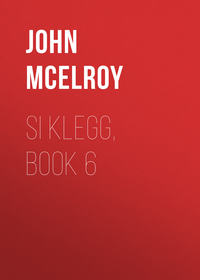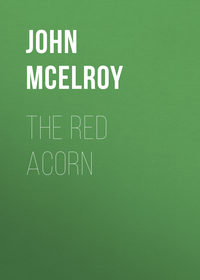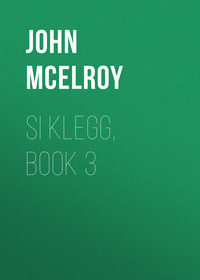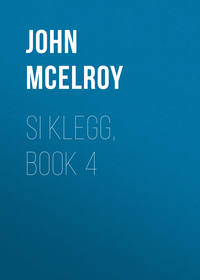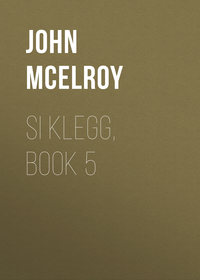 полная версия
полная версияSi Klegg, Book 1
"I say. Shorty," he called, "cum 'ere a minnit, quick!"
Si's conscience smote him for calling Shorty from his duty and leaving the post unguarded, but the temptation was too strong for him to resist, and he yielded to the impulse to take the chances. Shorty came on the run, with eyes wide open, thinking his comrade had discovered some rebels hanging around.
"Look there!" said Si, pointing to the maternal scene that has been alluded to. "Let's have some o' that. We'll git over the fence 'n' you jest hold the calf while I milk our canteens full. 'Twont take more'n a jiffy!"
"We ort n't to leave the post, ort we?" suggested Shorty.
"Oh, there ain't no danger," Si replied; "an' besides, you can keep lookin' out while you're hangin' on to the calf. I was alters a good milker 'n' I'll fill up these canteens in a couple o' minnits." So they climbed over and leaned their muskets against the fence. Shorty seized the calf and held it with a firm grip, in spite of its struggling and bleating. The cow seemed disposed at first to resent the interference, but Si's persuasive "So, bossy" proved effectual in calming her fears, and she stood placidly chewing her cud while Si, spurred on by a guilty conscience, milked with all his might.
The canteens were soon filled, and, with out stopping to drink. Si and Shorty hurried back to their post of duty. All was quiet, and no harm had resulted from their brief absence.
"I told ye 'twould be all right," said Si. "Now, we'll jest empty one o' these canteens—here, take a swig—'n' we'll carry the other to camp. It'll be jest bully to have milk in our coffee agin!"
Then they betook themselves to duty with redoubled vigilance, to atone for their derelictions. After watching for an hour without seeing anything, Si said he would take another little turn around the place.
Boldly advancing to the house, which was some distance in front of their post, he was met by a girl of about 18. She was rather pretty, but to Si's ardent imagination she was like a vision of surpassing loveliness. She greeted him pleasantly—for Si was a comely youth—and, if the truth must be told, he actually forgot for the moment all about his duty. When she said she would get him a good dinner, and invited him into the house to sit while she prepared it, he just went right along.
But his conscience began to thump so loudly that after a few minutes he told her he guessed he'd have to go, but would be delighted to return in an hour and partake of her hospitality.
"May I bring Shorty—he's my pard—'long with me?" he timidly asked.
"Certainly!" she replied, with a sweet smile; and Si went away, his nerves tingling with pleasant emotions to the very tips of his fingers.
"Shorty," he said, as he came up to "I've struck it this time. Over to that house there's the purtiest gal I ever see."
"Wha-a-a-a-t!" interjected Shorty, with a look of astonishment; for he knew something about Si and Annabel—the girl he left behind him—and he was both surprised and pained at Si's treasonable enthusiasm.
Si easily divined his thoughts, for something of the same nature had already caused his own heart to palpitate in a reproving way.
"Of—c-c-course—I d-d-don't—mean th-th-that. Shorty," he stammered "but she's a nice girl, anyhow, 'n' she's gittin' up a dinner fer me 'n' you. Bet ye it'll be a nice lay-out, too!"
Shorty did not feel quite at ease in his mind about leaving the post again, but Si assured him it would be all right. The peculiar circumstances of the case had sadly warped Si's judgment.
So they went to the house and were cordially greeted by their fair young hostess, who was flying around, putting the finishing touches to the meal she had prepared for them.
"Jiminy, don't that smell good?" said Si to Shorty in an undertone, as his sensitive nostrils caught the savory odors that arose from the nicely-spread board.
The young soldiers stood their guns on the floor in a corner of the room, preliminary to an assault on the edibles.
"Ugh!" exclaimed the young woman, with a coquettish shiver, "be them awful things loaded?"
"N—no!" said Si; "they won't hurt ye if ye don't touch 'em!"
Si was learning to fib a little, and he wanted to quiet the girl's fears.
The boys were soon seated at the table, bountifully supplied with ham, chicken, eggs, bread and butter, honey, and all the accessories of a well-ordered repast. They fell to with an eagerness that was, perhaps, justified by the long time that had elapsed since they had had a "square meal." Si thought that never in his life had anything tasted so good.
While they were thus engaged, without a thought of impending danger, the girl suddenly opened the door, leading to the dining room. A wild-eyed man—who proved to be her brother—in the uniform of a rebel soldier, dashed in, and, presenting a cocked revolver, demanded their unconditional and immediate surrender.
They were in a tight place. But Si proved equal to the sudden and appalling emergency. It flashed through his mind in an instant how the girl had "played it" on him. He made up his mind that he would rather be shot than be captured under such circumstances.
Si sprang up, and the rebel, true to his word, fired. Si dodged, and the ball only chipped a piece from his left ear. There was not time to get and use his gun. With the quickness of a cat Si sprang upon him, and with a blow of his fist laid him sprawling upon the floor. Disarming him, he placed the revolver at his head and triumphantly exclaimed:
"Now, gol durn ye, you're my prisoner. I'd like to blow the top o' yer head off fer spilin' my dinner, but I won't do it this time. But you jist git up 'n' come 'long with me!"
With his complete mastery of the situation, Si's confidence returned, and Shorty, who had been dazed and helpless at first, recovered himself and came to his assistance.
But at this instant their ears caught the sound of horses' hoofs galloping down the pike. Si's quick perception told him that is was a dash of rebel cavalrymen, and that a few moments later escape would be impossible.
"Grab yer gun an' git!" he said to Shorty, at the same time casting one ferocious glance at the terrified girl, who stood, white and speechless, contemplating the scene.
Si and Shorty dashed out of the house and started for the reserve, at the highest speed of which their legs were capable. On clattered the horses, and a few shots from the carbines of the swift-riding horsemen whistled through the air.
Six feet at a jump, with thumping hearts and bulging eyes, the fugitives almost flew over the ground, throwing quick glances at their pursuers, and then ahead, in the hope of catching a glimpse of succor.
"Shorty, if we only git out o' this—" but Si found he hadn't any wind to spare to finish the sentence. We must leave to the reader's imagination the good resolutions as to his future conduct that were forming in Si's mind at this critical juncture. He saw the awful consequences of yielding to the influence of that alluring young woman and her seductive dinner. What he had read about Adam and the trouble Eve got him into, in pretty much the same way, flashed before him. It was a good time to resolve that he wouldn't do so any more.
Shorty, long and lank, was swifter on his feet than Si. Hardtack and bacon had not yet reduced the latter's surplus flesh to a degree that enabled him to run well. Shorty kept ahead, but would not desert his comrade, slowing up for an instant now and then to give Si, who was straining to the utmost every nerve, and puffing like a locomotive on an upgrade, a chance to keep within supporting distance.
The soldiers of the reserve taking the alarm, came out at a double-quick and were fortunately able to cover the retreat of Si and Shorty. The half dozen cavalrymen, upon the appearance of so large a force, turned their horses and galloped away.
"Hello, Si," said the Orderly of Co. Q, "yer ear's bleedin'. What hurt ye?"
"Fell down and scratched it on a brier!" said Si, as soon as he was able to speak.
That night Si and Shorty sat on a log by the campfire talking over the events of the day.
"Don't ye never blow on this thing," said Si. "It'll be a cold day for us if they'd find it out."
"There ain't no danger o' my tellin'," replied Shorty. "But, say, ain't that a nice girl out there?"
"She's a mean rebel, that's what she is! But that was a smart trick o' her'n, wasn't it?"
"Come mighty near bein' too smart fer us!" replied Shorty. "I don't want no more such close shaves in mine. You 'member the story of the spider and the fly, don't ye? Well, she was the spider 'n' we was two poor little fool flies!"
"Shorty," said Si, "I'd a mighty sight ruther be an angel an' have the daisies a-bloomin' over my grave, than to have been tuk a prisoner in that house. But that dinner was good, anyhow—what we got of it!"
CHAPTER XX. "THE SWEET SABBATH"
HOW THE BLESSED DAY OF REST WAS SPENT IN THE ARMY"TOMORROW'S Sunday, ye know," said the Orderly of Company Q one Saturday night at roll-call.
This was in the nature of news to the boys. But for the announcement very few of them would have known it. The Orderly was not distinguished for his piety, and it is not likely that the approach of Sunday would have occurred to him if the Sergeant-Major had not come around with orders from the Colonel for a proper observance of the day. The Colonel himself would not have thought of it either, if the Chaplain had not reminded him of it. Everybody wondered how even the Chaplain could keep track of the days well enough to know when Sunday came—but that was chiefly what he wore shoulder-straps and drew his salary for. It was the general impression that he either carried an almanac in his pocket, or else a stick in which he cut a notch every day with his jack-knife, and in that way managed to know when a new week began.
"There'll be guard-mountin' at 9 o'clock," continued the Orderly, "regimental inspection at 10, preachin' at 11, an' dress-parade at 5 in the evenin'. All of ye wants to tumble out right promptly at revellee an' git yer breakfast, an' then clean up yer guns an' put all yer traps in apple-pie order, 'cause the Colonel's goin' to look at 'em. He's got sharp eyes, an' I reck'n he'll be mighty pertickler. If there's anything that ain't jest right he'll see it quicker'n litenin'. Ye know we hain't had any inspections yet, an' the Cap'n wants us to be the boss company. So ye've got to scratch around lively in the mornin'."
"Say," said Corporal Klegg, after the company had broken ranks, "seems to me there wa'n't no use in the Orderly tellin' us to 'scratch around,' fer we're doin' that purty much all the time, now that the graybacks is gittin' in their work on us."
Shorty smiled faintly at what he seemed to consider a rather feeble joke, even for Si.
The 200th Ind. had now been in the field for many weeks, but it had been continually cantering about the country, and the Generals had kept it particularly active on Sundays. Probably this regiment did not manifest any more than the average degree of enthusiasm and fervor in religious matters, but there were many in its ranks who, at home, had always sat under Gospel ministrations, and to tramp on Sundays, the same as other days, was, at first, a rude shock to their moral sensibilities. These were yet keen, the edges had not been worn off and blunted and battered by the hard knocks of army life. True, they could scarcely tell when Sunday came, but they knew that they kept right along every day.
"Shorty," said Si, after they had curled up under the blanket for the night, "'pears to me it'll seem sort o' nice to keep Sunday agin. At the rate we've bin goin' on we'll all be heathens by the time we git home—if we ever do. Our Chaplain haint had no chance to preachify yet. The boys of Comp'ny X, w'at knows him, says he's a staver, 'n' I b'lieve it'll make us all feel better to have him talk to us once. 'Twont do us no harm, nohow, I'd like to be home to-morrer 'n' go to church with mother, 'n' sister Marier, 'n'—er—I mean the rest of the folks. Then I'd jest eat all the afternoon. I ain't goin' ter git homesick, Shorty; but a feller can't help feelin' a little streaked once 'n' a while. Mebbe it's a good idee fer 'em to keep us on the jump, fer then we don't git no chance to think 'bout it. I don't suppose I'm the only boy 'n the regiment that 'd be glad to git a jest fer to-morrer. I sh'd want ter be back bright 'n' arly to fall in Monday mornin', fer I'm goin' to stick to the 200th through thick 'n' thin, if I don't git knocked out. Say, Shorty, how d'ye feel, any way?"
But Shorty was already fast asleep. Si spooned up to him and was soon, in his dreams, away up in Posey County.
The sound of the bugle and drum, at daylight, fell upon unwilling ears, for the soldiers felt the same indisposition to get up early Sunday morning that is everywhere One of the characteristics of modern civilization. Their beds were hard, but to their weary limbs no couch of down ever gave more welcome rest than did the rough ground on which they lay. But the wild yell of the Orderly, "Turn out for roll-call!" with the thought of the penalties for non-obedience—which some of them had abundant reason to remember—quickly brought out the laggards.
Si and Shorty were, as usual, among the first to take their places in line. They were pleasantly greeted by the Captain, who had come out on the run at the last moment, and wriggled himself into his coat as he strode along the company street. The Captain did not very often appear at morning rollcall. But one officer of the company was required to be present, and the Captain generally loaded this duty upon the Lieutenants "turn about." If he did show up, he would go back to bed and snooze for an hour while the cook was getting breakfast. If one of the men did that he would soon be promenading with a rail on his shoulder or standing on a barrel with a stick or a bayonet tied in his mouth.
"I think that's a fust rate notion to mount the guards," said Si to Shorty as they sat on a rail by the fire making coffee and frying bacon. "It'll be so much better 'n walkin' back 'n' forrard on the beats. Wonder 'f they'll give us bosses or mules to ride."
"I'd like to know what put that idee into yer head," said Shorty.
"Whydn't the Ord'ly say last night there 'd be guard-mountin' at 9 o'clock this mornin'? I s'posed that fer a man to be mounted meant straddlin' a boss or s'mother kind of an animal."
"Ain't ye never goin' to larn nuthin'," said Shorty, with a laugh. "Guard-mountin' don't mean fer the men to git on hosses. It's only the name they gives it in the Army Reggelations. Dunno why they calls it that, 'nless it's 'cause the guards has to 'mount' anybody that tries to pass 'thout the countersign. But don't ye fool yerself with thinkin' yer goin' to get to ride. We'll keep pluggin' along afoot, on guard or anywhere else, same's we have all the time."
Thus rudely was shattered another of Si Klegg's bright illusions.
The whole regiment turned out to witness the ceremony of guard-mounting. It was the first time the exigencies of the campaign had permitted the 200th Ind. to do this in regular style. The Adjutant was the most important personage, and stood so straight that he narrowly escaped falling over backward. In order to guard against making a mess of it, he had spent half the night rehearsing the various commands in his tent. Thus prepared, he managed to get through it in very fair shape.
The next thing on the program for the day was the inspection. The boys had been industriously engaged in cleaning up their muskets and accouterments, and putting their scanty wardrobes in presentable condition. In arranging his knapsack for the Colonel's eye, each man carefully laid a clean shirt, if he had one, on the top. The garments that were not clean he either stowed away in the tent or put at the bottom of the knapsack. In this he was actuated by the same principle that prompts the thrifty farmer to put the biggest apples and strawberries at the top of his measure.
The clothing of the regiment was already in an advanced stage of demoralization. It was of the "shoddy" sort that a good hard wind would almost blow to pieces.
Corporal Klegg was anxious that not only his person, but all his belongings, should make as good an appearance as possible. He put on the best and cleanest garments he had, and then betook himself to fixing his knapsack so it would pass muster.
"Them duds is a bad lot," he said to Shorty, casting rueful glances at the little heap of soiled and ragged clothes. "Purty hard to make a decent show with them things."
"Wait a minute," said Shorty, "an' I'll show ye a little trick."
Taking his poncho under His arm. Shorty went to the rear of the camp, where the mules were feeding, and presently returned with a bunch of hay.
"What ye goin' to do with that?" asked Si.
"You jest do 's I tell ye, and don't ask no questions. Cram some o' this hay into yer knapsack 'n' fill 'er up 'n' then put a shirt or suthin', the best ye kin find, on top, 'n' the Colonel 'll think she's full o' clothes right from the laundry. I'm goin' to fix mine that way."
"Shorty, you're a trump!" said Si, approvingly. "That 'll be a bully scheme."
It required but a few minutes to carry out the plan. The hay was stuffed into the knapsack, and all vagrant spears were carefully tucked in.
Then a garment, folded so as to conceal its worst features, was nicely spread over the hay, the flaps were closed and buckled, and the young Hoosiers were ready for inspection.
"S'posen the Colonel sh'd take a notion to go pokin' down into them knapsacks," said Si; "don't ye think it'd be purty cold weather for us?"
"P'r'aps it mout," answered Shorty; "but we've got ter take the chances. He's got seven or eight hundred knapsacks to 'nspect, 'n' I don't b'lieve he'll stick his nose down into very many on 'em!"
At the appointed time the battalion was formed and the inspection was gone through with in good style. The Colonel and the field and staff officers, escorted by the Captain of each successive company, moved gradually between the ranks, their swords dangling around and getting mixed up with their legs. The soldiers stood facing inward like so many wooden men, with their open knapsacks lying upon the ground at their feet. The Colonel looked sharply right and left, stopped now and then to commend a soldier whose "straps" were in particularly good condition, or to "go for" another whose slouchy appearance betokened untidy habits. If a button was missing, or a shoe untied, his eye was keen to detect it, and a word of reproof was administered to the delinquent.
As the Colonel started down the line of Company Q Si watched him out of the corners of his eyes with no little anxiety. His heart thumped as he saw him occasionally stoop and fumble over the contents of a knapsack, evidently to test the truth of Longfellow's declaration that "things are not what they seem." What if the Colonel should go down into the bowels of Si's knapsack! Si fairly shuddered at the thought.
Si, being the shortest of the Corporals, was at the foot of the company, while Shorty, on account of his hight, was well up toward the head. Si almost fainted when he saw the Colonel stop in front of his "pard" and make an examination of his fatlooking knapsack. Military official dignity gave way when the removal of the single garment exposed the stuffing of hay. The officers burst into a laugh at the unexpected revelation, while the boys on either side almost exploded in their enjoyment of Shorty's discomfiture.
"Captain," said the Colonel, with as much sternness as he could command, "as soon as your company is dismissed detail a guard to take charge of this man. Have him take the hay out of his knapsack and fill it with stones—and see that it is filled full. Have this man put it on and march him up and down the company street till church-call, and then take him to hear the Chaplain. He needs to be preached to. Perhaps, between the knapsack-drill and the Chaplain, we can straight him out."
Corporal Klegg heard all this, and he wished the ground might open and swallow him. "These stripes is gone this time, sure!" he said to himself, as he looked at the chevrons on his arm. "But there's no use givin' yourself away, Si. Brace up, 'n' mebbe the Colonel 'll skip ye."
Si had been badly shaken up by the Colonel's episode with Shorty, but by a great effort he gathered himself together and was at his best, externally, when the Colonel reached him, though his thoughts were in a raging condition. His face was clean and rosy, and his general make-up was as good as could be expected under the circumstances.
The Colonel had always remembered Si as the soldier he had promoted to be a Corporal for his gallantry in the little skirmish a few days before. As he came up he greeted the Corporal with a smile and a nod of recognition. He was evidently pleased at his tidy appearance. He cast a glance at the voluptuous knapsack, and Si's heart seemed to sink away down into his shoes.
But the fates smiled on Si that day. The Colonel turned to the Captain and told him that Corporal Klegg was the model soldier of Company Q. Si was the happiest man in the universe at that precise moment. It was not on account of the compliment the Colonel had paid him, but because his knapsack had escaped a critical inspection of its contents.
The inspection over, Company Q marched back to its quarters and was dismissed. Poor Shorty was soon tramping to and fro, under guard, humping his back to ease the load that had been put upon it. Si was very sorry for him, and at the same time felt a glow of pleasure at the thought that it was not his own knapsack instead of Shorty's that the Colonel had examined. He could not help feeling, too, that it was a great joke on Shorty to be caught in his own trap.
Shorty took his medicine like a man, marching up and down the row of tents bravely and patiently, unheeding the gibes and jeers of his hard-hearted comrades.
The bugle sounded the call for religious services. Shorty was not in a frame of mind that fitted him for devout worship. In fact, few in the regiment had greater need of the regenerating influence. He had never been inside of a church but two or three times in his life, and he really felt that to be compelled to go and listen to the Chaplain's sermon was the hardest part of the double punishment the Colonel had inflicted upon him.
The companies were all marched to a wooded knoll just outside the camp. Shorty went by himself, save the companionship of the guard, with fixed bayonet. He had been permitted to leave his knapsack behind. He was taken to a point near the Chaplain, that he might get the full benefit of the preacher's words.
Under the spreading trees, whose foliage was brilliant with the hues of Autumn, in the mellow sunshine of that October day the men seated themselves upon the ground to hear the Gospel preached. The Chaplain, in his best uniform, stood and prayed fervently for Divine guidance and protection and blessing, while the soldiers listened, with heads reverently bowed. Then he gave out the familiar Methodist hymn,
"Am I a soldier of the cross,"and all joined in the old tune "Balerma," their voices swelling in mighty chorus. As they sang,
"Are there no foes for me to face?"there came to the minds of many a practical application of the words, in view of the long and fruitless chase after the rebels in which they had been engaged for nearly a month.
The Chaplain had formerly been an old-fashioned Methodist circuit-rider in Indiana. He was full of fiery zeal, and portrayed the terrors of eternal punishment so vividly that His hearers could almost feel the heat of the flame and smell the fumes of brimstone that are popularly believed to roll out unceasingly from the mouth of the bottomless pit. It ought to have had a salutary effect upon Shorty, but it is greatly to be feared that he steeled his stubborn heart against all that the Chaplain said.
It was always difficult not to feel that there was something contradictory and anomalous about religious services in the army. Grim-visaged, hideous war, and all its attendant circumstances, seemed so utterly at variance with the principles of the Bible and the teachings of Him who was meek and lowly, that few soldiers had philosophy enough to reconcile them.
The soldiers spent the afternoon in reading what few stray books and fugitive, well-worn newspapers there were in camp, mending their clothes, sleeping, and some of them, we are pained to add, in playing eucher, old sledge, and other sinful games. Dress parade closed the day that had brought welcome rest to the way-worn soldiers of the 200th Ind..


